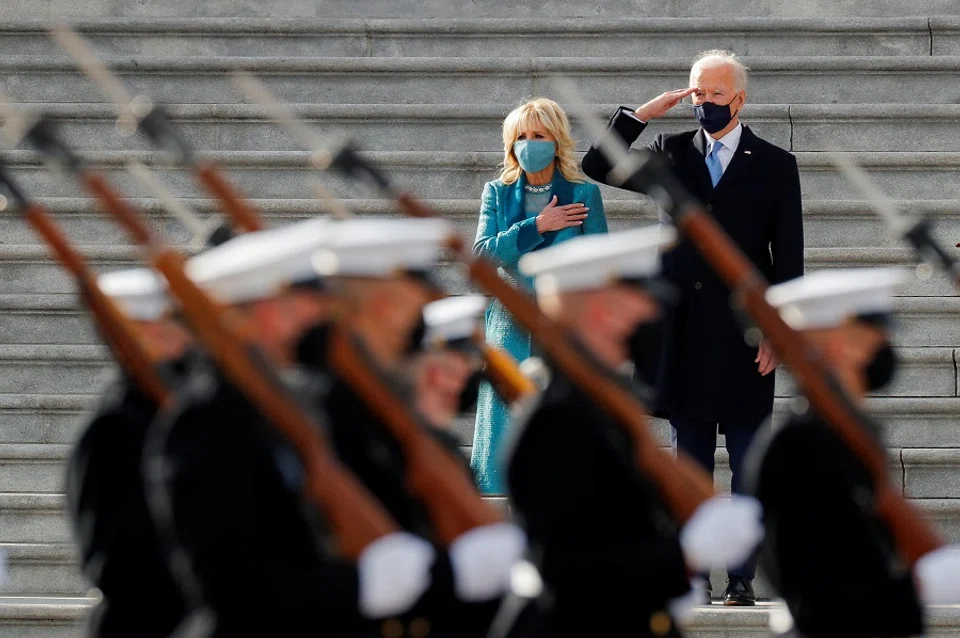What can we expect from Biden's 'approach of patience' towards US-China relations
Those in China hoping that the Biden administration's new broom will sweep US-China relations clean may be in for a disappointment. Truth be told, Trump's words were harsh and actions brash, but his sentiments reflected the times. US academic Wu Guo unravels the true meaning of the Biden administration's "approach of patience" towards China.

Since its installation, the Joe Biden administration seems to be adopting an "approach of patience" towards US-China relations as articulated by White House press secretary Jen Psaki on 25 January 2021.
The word "patience" hints at the fact that at this juncture, the appetite in the White House is simply not strong for seeking a quick reset and restart of US-China relations. It is not a question of sincerity or whether the Biden administration is too busy fighting the pandemic or healing partisan divides.
In reality, former US President Donald Trump's attitude towards China largely reflected American mainstream public opinion, and also enjoyed bipartisan consensus. The only difference between then and now is in the choice of words, the mode of conduct and the strategies adopted.
Limited areas of compromise in the US's China policy
The obstacles standing between China and the US can roughly be organised into "soft obstacles" and "hard obstacles".
The soft obstacles include import and export trade, a number of US-listed Chinese high-tech enterprises, educational and cultural exchanges, and so on. In these areas, the Biden administration is expected to gradually reverse some of Trump's radical policies in terms of recognising the need to attract rather than turn away Chinese talents and reevaluating the results of the trade war. There is no doubt that the US's interests would be at the core of these considerations.
Biden's ban on the use of the term "China virus" is actually in line with the Democratic Party's ideology of non-discrimination and diversity. This is a positive affirmation of the Chinese and Asian community and also conducive to creating an atmosphere of unity in the US. However, on the technological front, as the transfer of certain "sensitive" technologies could undermine US's national security, the Biden administration will be as tough as the former Trump administration in its efforts to prevent China from laying hands on these technologies.
Also, from the provocative act of openly inviting a Taiwanese representative to attend Biden's inauguration, the newly-installed government's attitude towards Taiwan and the implications of the word "patience" are clear for all to see.

In terms of hard obstacles such as the Xinjiang problem, the Hong Kong national security law, Taiwan, South China Sea, the Senkaku/Diaoyu islands dispute, and even the overall characterisation of China and China's rise, the Biden administration will basically maintain the positions and policies of the former Trump administration.
On these issues, there is basically no disagreement among American political elites, from the president to the cabinet and Congress. They will also not make any compromises with China on these issues. Not only that, the Biden administration will also attempt to repair its relations with its traditional allies in order to work together against China. Also, from the provocative act of openly inviting a Taiwanese representative to attend Biden's inauguration, the newly-installed government's attitude towards Taiwan and the implications of the word "patience" are clear for all to see.
On the path of no return
At the same time, the older generation of "China experts" in the US who still have some goodwill towards China and who wield considerable influence in academic circles and policy-making platforms are becoming few and far between. A significant number of experts from this generation were influenced by "The Great Chinese Revolution" (in John K. Fairbank's The Great Chinese Revolution: 1800-1985); they were genuinely curious about the once closed China and were zealous in their affirmation of the achievements of China's reform and opening up. However, such passion can hardly be found among the middle-aged "China experts" or policy makers and advisers of today. Newer generations of China researchers in the US are increasingly facing the rising and complicating China with a grim attitude.
It is unrealistic to hope that China and the US will put aside their differences in ideology, values, and institutions, and develop a long-term friendship returning to the state of seemingly close cooperation in the past. To the Americans, the differences between themselves and China have always been real and clear - they had just temporarily put them aside due to certain geopolitical considerations.
In fact, Trump and former US Secretary of State Mike Pompeo's handling of US-China relations is a true reflection of what many in the current government have in mind but have yet to articulate.

Under the rubric of suitably fixing the soft obstacles, and not compromising on or even magnifying the hard obstacles, the Biden administration would naturally adopt "an approach of patience" and not rush to mend or advance US-China relations. As I mentioned earlier, such patience is not due to the many problems facing US society, but because there is simply a lack of appetite to do otherwise.
In fact, Trump and former US Secretary of State Mike Pompeo's handling of US-China relations is a true reflection of what many in the current government have in mind but have yet to articulate. The former administration has paved the way and set the tone for the fundamental shift in US-China relations that has already taken place and which will continue to do so. Those who pinned their hopes on the Biden administration first settling their internal affairs then showing their sincerity in improving US-China relations may find themselves disappointed.
Related: Chinese dissidents and their role amid worsening China-US relations | Decoding the 'hyperactive' outgoing Trump administration | Can America find its way under Biden? | Japanese academic: The Chinese and Japanese differ in their perceptions of Biden's China policy | Mourning the dearth of China experts in the West with a deep understanding of China



![[Photos] Fact versus fiction: The portrayal of WWII anti-Japanese martyrs in Taiwan](https://cassette.sphdigital.com.sg/image/thinkchina/3494f8bd481870f7c65b881fd21a3fd733f573f23232376e39c532a2c7593cbc)

